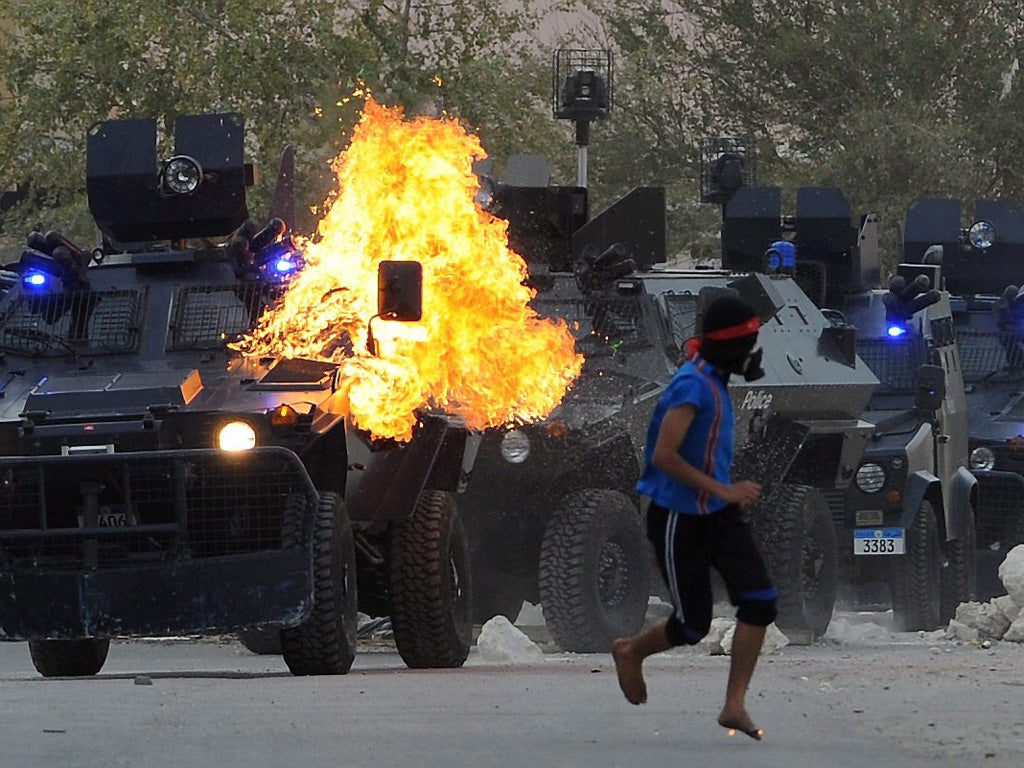UK accused of 'double standards' over weapons exports to Bahrain
Rights groups say situation in flashpoint country is being ignored while 'commercial interests' are put first

A Bahraini human rights organisation has issued a stinging rebuke of Western governments and their attitudes to what it describes as a desperate situation in the country, saying that many are putting commercial interests ahead of human rights.
On Wednesday, the Bahrain Center for Human Rights (BCHR) was among the winners at the Index for Censorship awards ceremony, and yesterday it reiterated its case that the situation in the tiny Gulf state was being ignored.
"It is largely about arms sales," said Maryam Al-Khawaja, head of the BCHR's international operations. "The West is guilty of double standards. The US, UK and France attack Russia for providing weapons to Syria, but that's exactly what they are doing for the Bahrain government; Russia is criticised for a naval base in Syria, but the US has one here.
"How can it be that bodies like the UN intervene in Libya and openly talk about backing those wanting greater freedoms in Syria when the intervention here is on the behalf of those that continue to crack down on these demands?"
In February last year, at the height of the unrest, the British Government said it would review arms exports to Bahrain, which at the time included crowd control measures such as "CS hand grenades, demolition charges, smoke canisters and thunderflashes".
According to research by the Campaign Against the Arms Trade, several licences were granted for arms exports, including in February and March 2011, and during the height of the violence. In April last year, an export licence for "training hand grenades" worth more than £70,000 was issued, and was followed later in the year by licences for the sale of "body armour" "gun silencers" and "weapons sights".
It is not possible to tell if this equipment was used by the Bahraini government. Since January 2010, more than £7m of military export licences have been granted to British companies by the Department for Business, Innovation and Skills. It said yesterday: "The Government takes its export responsibilities very seriously, and operates one of the most rigorous arms export control regimes in the world.
"We reacted quickly to events of the Arab Spring, reviewing all licences to Bahrain, and we have revoked licences where there was evidence that they were no longer in line with the consolidated criteria. Events of the Arab Spring have underlined the importance of ensuring that exports of UK defence equipment are carefully scrutinised."
Denis MacShane, the Labour MP who challenged the Foreign Secretary, William Hague, in the Commons last year over arms exports to Bahrain, said Britain should be ashamed of its record of arms sales to Bahrain. "Last year's review... was utterly cynical and the Government should be ashamed," he said.
The Bahraini government says it has made progress in implementing reforms suggested in the wide-ranging Bahrain Independent Commission of Inquiry (BICI) report. The report was backed by King Hamad bin Isa Al Khalifa and in parts was damning of the state's response to the uprising, between the largely Shia opposition, the majority in the country, and security forces backing the ruling Sunni elite.
The Foreign Office has said that it believes there is room for further reform by the Bahraini government, despite evidence of progress.
Britain gives £500,000 to Syrian rebels
Britain will provide £500,000 in aid for the Syrian opposition groups inside the country. It is intended that some of the money will be used to secure evidence of atrocities committed by the forces of Bashar al-Assad.
The remainder of the funds is expected to be spent on communications and medical equipment and civic society projects. The money comes on top of the £450,000 that has been given over the past eight months to rebel groups outside Syria.
The international Friends of Syria group meets in Istanbul this weekend to discuss more backing for the opposition, with Saudi Arabia and Qatar pressing for rebel militias to be given military support.
Kim Sengupta
Join our commenting forum
Join thought-provoking conversations, follow other Independent readers and see their replies
Comments
Bookmark popover
Removed from bookmarks